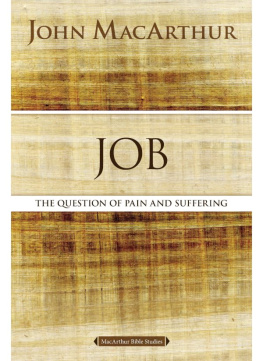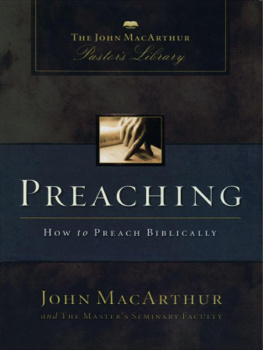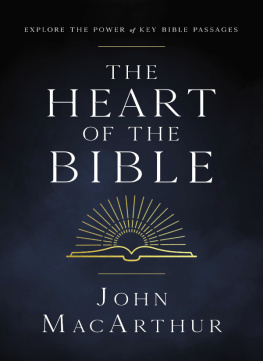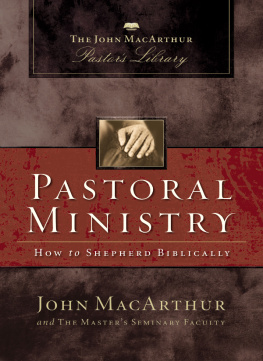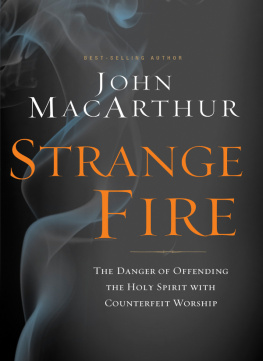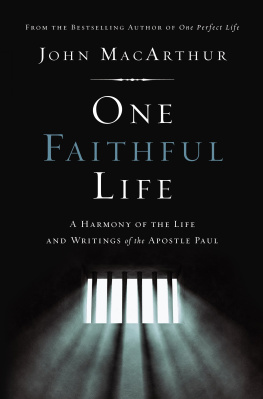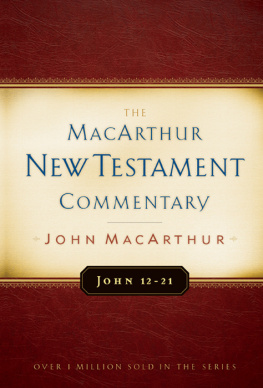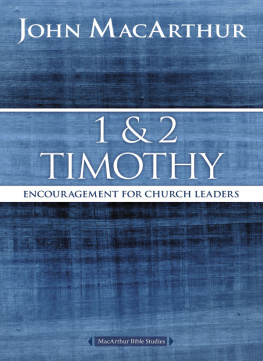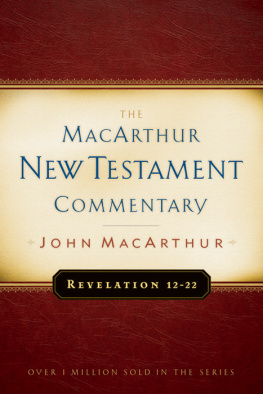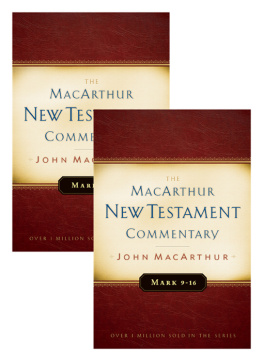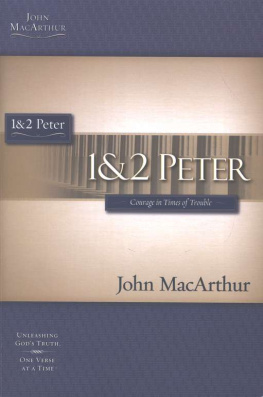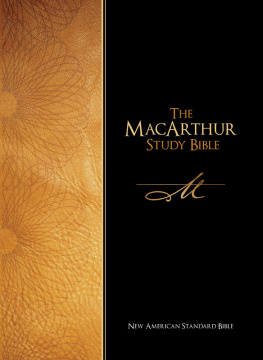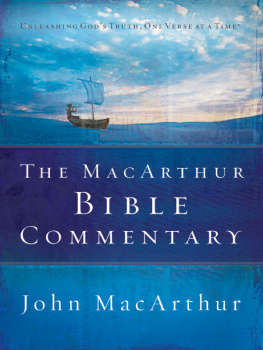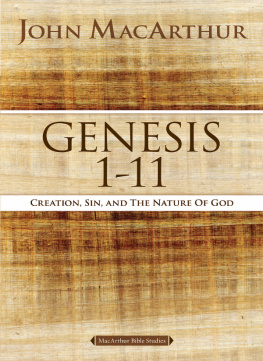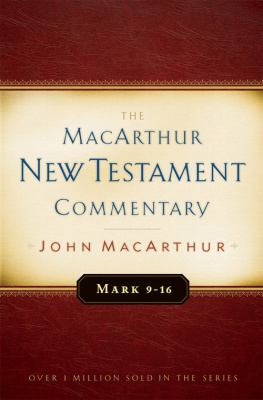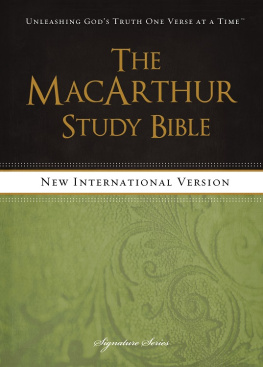In this ebook edition, please use your devices note-taking function to record your thoughts wherever you see the bracketed instructions [Your Notes] or [Your Response Here]. Use your devices highlighting function to record your response whenever you are asked to checkmark, circle, underline, or otherwise indicate your answer(s).
W hy does suffering exist in the world? Why does God allow the righteous to endure tragedy when the wicked often seem to enjoy lives of luxury? Where is God in time of pain? These questions have puzzled people for centuries, with no easy answers at hand. Thankfully, we can wrestle with the underlying themes of those questions by exploring the story of Job.
In these twelve studies, we will examine the events in the book of Job. We will witness the curtain being pulled back on the supernatural forces at work in our world and see Satans role as the agitator behind some of the pain and suffering we experience. We will read how Job had everything stripped away in a single dayhis children, servants, wealth, and healthand how this forced him to grapple with the reality of suffering. We will meet Jobs four friends and hear how they pushed Job to accept the belief that suffering is always a punishment for sin and rebellion against God. Ultimately, we will see God intervene in the debate, teaching Job and his friends a valuable lesson about His sovereignty.
Through it all, we will learn why it is appropriate to cry out to God in the midst of our tragedyand even express our anguish and our desire for relief. In the end, we will discover, as Job came to realize, that God is sovereign, infinitely wise, loving, and full of compassion, so we must trust Him in every situationeven when those attributes seem to be eclipsed for a time.
T ITLE
The book of Job bears the name of the narratives primary character. This name might have been derived from the Hebrew word for persecution (meaning persecuted one or from an Arabic word meaning repent (thus repentant one). The author recounts an era in the life of Job, in which he was tested and the character of God was revealed. Paul quoted from Job (see Romans 11:35 and 1 Corinthians 3:19), and James referred to him as well (see James 5:11).
A UTHOR
The book does not name its author. Job is an unlikely candidate, as the books message rests on his ignorance of the events in heaven that related to his ordeal. One tradition suggests that Moses was the author, for the land of Midian where he lived for forty years was adjacent to Uz (see 1:1), and he could have obtained a record of the story there. Solomon is also a possibility, due to the similarity of content with parts of Ecclesiastes and the other wisdom books. Elihu, Isaiah, Hezekiah, Jeremiah, and Ezra have also been suggested as authors, but without support.
D ATE
It is likely that the book of Job was written much later than the events depicted in its pages. Job had a lifespan of nearly 200 years (see 42:16), which fits the patriarchal period (e.g., Abraham lived 175 years according to Genesis 25:7). Furthermore, the social unit was structured around the patriarchal family, the Chaldeans (who murdered Jobs servants) were still nomadic and not yet city dwellers (see 1:17), Jobs wealth was measured in livestock rather than gold and silver (see 1:3; 42:12), Job conducted priestly functions within his family (see 1:45), and the text is silent on matters such as the covenant of Abraham, Israel, the Exodus, and the Law of Moses. However, Job appears to know about Adam (see 31:33) and the flood (see 12:15). These features appear to place the events chronologically at a time after the Tower of Babel (see Genesis 11:19) but before or contemporaneous with Abraham (see Genesis 11:27).
B ACKGROUND AND S ETTING
This book begins with a scene in heaven that explains to the reader everything that will take place (see 1:62:10). Job was suffering because God was contesting with Satan. Job did not know this, nor did his friends; so they all struggled to explain suffering from the perspective of their ignorance. Finally, Job rested in nothing but his faith in Gods goodness and the hope of His redemption, and his trust was then vindicated by Gods intervention and the full restoration of Job. The overall message of the book is to trust God even when there seem to be no rational, or even theological, explanations for disaster, pain, and suffering.
H ISTORICAL AND T HEOLOGICAL T HEMES
The events that occur in the book of Job present readers with a profound question: Why do the righteous suffer? Although an answer to this question seems important, the book does not set forth such a response. Job never learned the reasons for his suffering. In fact, when God finally confronted Job, he could only put his hand over his mouth and say nothing. His silence underscores the importance of trusting Gods purposes in the midst of suffering, because sufferinglike all other human experiencesis directed by perfect divine wisdom.
The book treats two major themes, both in the narrative framework of the prologue (see Job 12) and epilogue (see 42:717), and in the poetic account of Jobs torment that lies in between (see 3:142:6). A key to understanding the first theme is to notice the debate between God and Satan in heaven and how it connects with the three cycles of earthly debates between Job and his friends. God wanted to prove the character of believers to Satan and all demons, angels, and people. Satan had objected that Gods claims of Jobs righteousness were untested. He accused the righteous of being faithful to God only for what they could get in return.
Satans confidence that he could turn Job against God came, no doubt, from the fact that he had led the holy angels to rebel with him. Satan thought he could destroy Jobs faith by inflicting suffering on him. God released Satan to make his point. But Satan failed, as Jobs true faith in God proved unbreakable. Satan tried to do the same to Peter (see Luke 22:3134) and was unsuccessful in destroying his faith (see John 21:1519). In the end, God proved that saving faith cant be destroyed, no matter how much trouble a saint endures.

